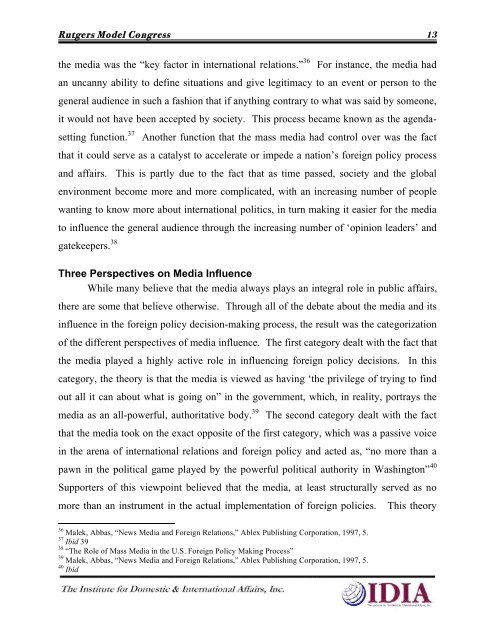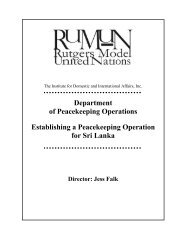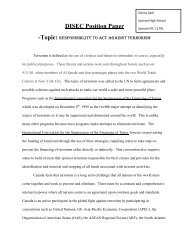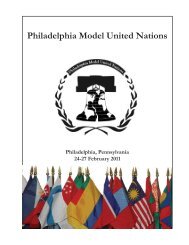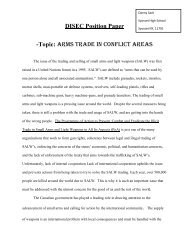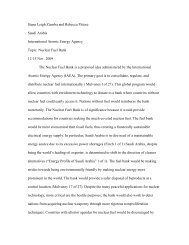National Press Corps Director: Sam Zeidman - Institute for Domestic ...
National Press Corps Director: Sam Zeidman - Institute for Domestic ...
National Press Corps Director: Sam Zeidman - Institute for Domestic ...
You also want an ePaper? Increase the reach of your titles
YUMPU automatically turns print PDFs into web optimized ePapers that Google loves.
R u t g e r s Mo d e l C o n g r e s s 13<br />
the media was the “key factor in international relations.” 36<br />
For instance, the media had<br />
an uncanny ability to define situations and give legitimacy to an event or person to the<br />
general audience in such a fashion that if anything contrary to what was said by someone,<br />
it would not have been accepted by society. This process became known as the agendasetting<br />
function. 37 Another function that the mass media had control over was the fact<br />
that it could serve as a catalyst to accelerate or impede a nation’s <strong>for</strong>eign policy process<br />
and affairs. This is partly due to the fact that as time passed, society and the global<br />
environment become more and more complicated, with an increasing number of people<br />
wanting to know more about international politics, in turn making it easier <strong>for</strong> the media<br />
to influence the general audience through the increasing number of ‘opinion leaders’ and<br />
gatekeepers. 38<br />
Three Perspectives on Media Influence<br />
While many believe that the media always plays an integral role in public affairs,<br />
there are some that believe otherwise. Through all of the debate about the media and its<br />
influence in the <strong>for</strong>eign policy decision-making process, the result was the categorization<br />
of the different perspectives of media influence. The first category dealt with the fact that<br />
the media played a highly active role in influencing <strong>for</strong>eign policy decisions. In this<br />
category, the theory is that the media is viewed as having ‘the privilege of trying to find<br />
out all it can about what is going on” in the government, which, in reality, portrays the<br />
media as an all-powerful, authoritative body. 39 The second category dealt with the fact<br />
that the media took on the exact opposite of the first category, which was a passive voice<br />
in the arena of international relations and <strong>for</strong>eign policy and acted as, “no more than a<br />
pawn in the political game played by the powerful political authority in Washington” 40<br />
Supporters of this viewpoint believed that the media, at least structurally served as no<br />
more than an instrument in the actual implementation of <strong>for</strong>eign policies. This theory<br />
36 Malek, Abbas, “News Media and Foreign Relations,” Ablex Publishing Corporation, 1997, 5.<br />
37 Ibid 39<br />
38 “The Role of Mass Media in the U.S. Foreign Policy Making Process”<br />
39 Malek, Abbas, “News Media and Foreign Relations,” Ablex Publishing Corporation, 1997, 5.<br />
40 Ibid


